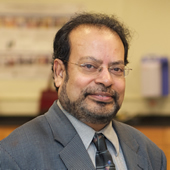Taking Indian theatre to global stage
US-based Dr Dipan Ray is a pharmacist and scientist by profession. Notwithstanding a successful research career, three patents and several publications, theatre is in his blood. Ray, who teaches at Touro University New York, began his ‘acting tour’ in the seventies and eighties in Kolkata under the guidance of Debesh Chakravarty, a disciple of the eminent theatre personality, Utpal Dutta.
Ray formed his own group Epic Actors’ Workshop in 1984 after moving to the US.
In 2008, he organized the South Asian Theater Festival in collaboration with New Jersey Performing Arts Center, the sixth largest cultural centre in North America. This began a new chapter in Indian Theatre in the US.
Ray is currently serving in the committee for Hepatitis B&C Coalition and Immunization Coalition with Department of Health and Mental Hygiene in New York City to determine policies to improve healthcare for New York City residents.
He received several awards from organizations such as Bangladesh Theater of America and New York City Council in 2005, Indo-Canada Overseas Broadcasting Corporation, Toronto in 2004, Rittik of Berhampore, West Bengal in 2010 and Good Citizen Award from Indian Cultural Society in 2012.
Speaking to me, Ray talks about his passion for theatre, how he introduced the concept of South Asian Theater Festival in North America and how he promotes Bengali and Indian playwrights’ work in the US.
Q: Will you please tell why and how you landed up in the US?
In 1984, I decided to move to the US to do PhD in pharmaceutical sciences.
Q: Did you face any problems in mixing your profession with drama-acting in the US?
I never had any problem to maintain my theatre activities along with my professional life, although it was not an easy task. Pharmacy is my profession, but theater is my passion.
While working with Debesh-da in Kolkata, I had an opportunity to see closely his dedication, sacrifice, discipline and love for theatre. This motivated me to carry out his legacy through an uninterrupted theater journey in the West for more than twenty five years.
Q: Your theatre activities must be driven by a philosophy….
My philosophy is to connect the diverse cultural entities breaking through geographical and cultural boundaries and at the same time celebrating the differences. With that objective in mind, I started South Asian Theater Festival in 2006 with a slogan “South Asian Theater Festival bringing communities together”.
Q: How do you merge the theories of Brecht and Stanislavsky in your production?
The ideal example of merging Brecht and Stanislavsky in our production is the production of Little Clay Cart. Director, Prof. Farley Richmond used Brecht’s theory of alienation using masks in some characters and allowing same actors to play multiple roles. At the same time he used Stanislavsky’s theory of naturalistic acting in some of the key characters where he used natural costume instead of masks.
Q: How significant is the name ‘Epic’ in your production?
We always try to address Social (abuse of women, for example) and political (anti war, for example) issues in our performance and try to create awareness among audience through post-performance discussion. This aligns with Brecht’s idea of Epic Theatre.
Q: Which are the places you went to with your productions?
In North America, we performed in New Jersey, New York, Boston, Washington, North Carolina, Atlanta, South Carolina, Ohio and Toronto.
We also performed at the following International Festivals globally: Kathmandu International Theater Festival (Nepal), NCPA Theatre Festival (Mumbai) and Nandikar Festival in Kolkata.
During the celebration of Tagore’s 150th Birth anniversary, we got special invitation to perform at Shantiniketan and ICCR, New Delhi.
In Kolkata, we participated in Padma-Ganga Utsab, Paschim Banga Natya Academy festival and Purba-Paschim Theater festival.
Q: Besides Bengali dramatists which foreign playwright you are indebted to?
Our idea is to promote Bengali and Indian playwrights’ work in the West. The only foreign playwright we are indebted to is Anton Chekhov.
Q: You’re credited with taking Indian theatres to the global stage. Hope you’ll continue to carry on with this moral responsibility…
I always look for new collaboration across the globe. My possible next collaboration will be with a young Afghan woman theater activist working with a Swedish director in Sweden.
Q: You must be aware that Debesh Chakravarty and his theatre group Epic Actors’ Workshop face numerous hurdles and are working against heavy odds…
Theatre for the right cause always struggle for finance and the West is no exception. For the first time in US, we were able to collaborate successfully with the western art organizations working for the similar cause to overcome such problems.
Q: How did you make use of Debesh Chakravarty’s acting technique in your work?
We do frequent workshops to incorporate physical acting into our performances. Besides Debesh-da, we were fortunate enough to participate in similar workshops with Badal Sarkar, Usha Ganguli and Habib Tanveer in the past.
Q: Please tell us the names of your productions. How many members are there?
We have about ten regular actors in our company. We also recruit new actors as and when required.
To name a few of our productions:
Bengali Productions: Bipanna Bishmoy and Naba Durbadal Shyam directed by Debesh Chakravarty, Chak Bhanga Madhu directed by Bibhash Chakroborty, Chirokumar Shabha directed by Ashok Mukhopadhaya, Dui Huzurer Gappo directed by Meghnad Bhattacharya, Pagla Ghoda directed by Amol Palekar, Aadab directed by Dhruba Dutta, Raat Jure directed by Sudipto Chattopadhaya and Girgiti directed by Suman Mukhopadhay.
Hindi: Rudali and Chehre directed by Usha Ganguli, Never Mind directed by Mohan Agashe.
English: Little Clay Cart, Sacrifice and Hayavadana directed by Prof. Farley Richmond, Bhopal directed by Joanna Sherman.
Q: Did you make Moilere’s Tartuffe and Brecht’s Saint Joan of the Stockyards (which Debesh Chakravarty produced)?
No, not yet. But the concept of Little Clay Cart production was similar to Debesh Chakravarty’s Saint Joan of the Stockyards where we used Balinese masks in some characters.
Q: How do you get funds for your productions? Are there any sponsors?
We are able to secure some funding from local county government and few individual sponsors. We are also able to obtain other logistical support through collaboration with other organizations.
Q: Debesh Chakravarty went to New Jersey in 1999. What are the things he did for your productions while in the US?
He conducted a workshop with the participants in International Fringe Theater Festival in New York. He also directed plays for us and travelled to Canada for the performance.
Q: How about your next production?
We recently produced Tin Payshar Pala under the direction of Abhik Chatterjee (nephew of famous theatre personality Ajitesh Bandopadhayay).
Q: Your views on Shambhu Mitra, Utpal Dutt, Badal Sarkar and Ajitesh Bandyopadhyay…
Each of them is an institution. While Shambhu Mitra was the pioneer in Bengali Group Theater movement who successfully brought Tagore’s plays on stage, Utpal Dutta made significant contribution to contemporary Bengali socio-political theatre. Badal Sarkar is the first person to take theatre out of proscenium to public arena. Ajitesh Bandyopadhayay on the other hand successfully adapted and staged Brecht’s and Chekov’s play with Indian perspective and wonderful presentation.
Q: How do you view the influence of political philosophy on drama production?
Society without politics doesn’t exist. Political philosophy will always be an integral part of production whichever way you want to look at.
Q: Your views on National Theatre…
Participation in NCPA (Mumbai) festival provided opportunity to witness the current trend in theatre practice at National level. More and more young theatre practitioners are bringing newer concepts and experimentation in their presentation. Young playwrights are creating plays addressing contemporary burning issues in the society. Theatre is now becoming more and more global.
Q: Recently a Black faced ‘chokehold death’ in the US. Do you face racism there?
We sporadically faced some issues like “Dot Buster” in Jersey City in the Eighties and some scattered incidents post 9/11. But, these are not significant.

